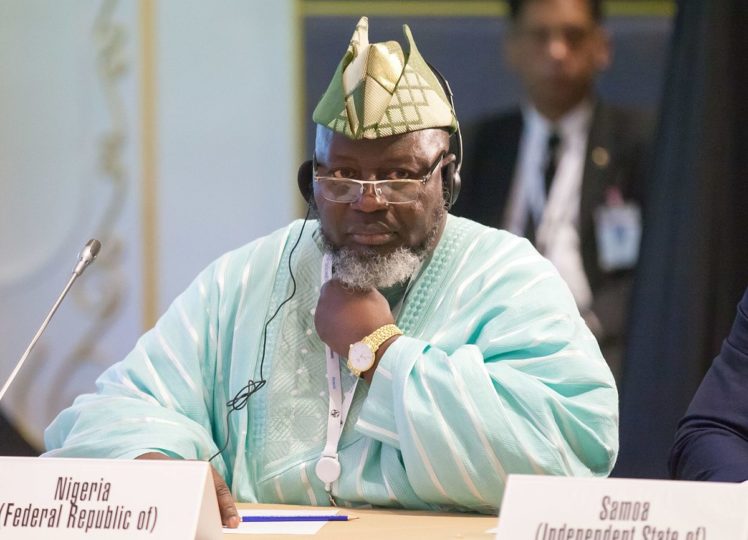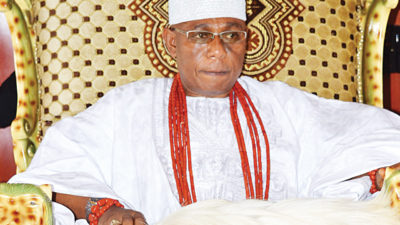Having waited six months before inaugurating his cabinet in November 2015, Nigerians had high hopes in President Muhammadu Buhari’s cabinet, on which Adebayo Shittu serves.
Three years down the line at the Ministry of Communication headed by Mr Shittu, the promises appear not to be totally at par with the expectations of Nigerians.
The helmsman promised to reposition the ministry especially in the areas of advancing communication as a top foreign exchange earner, quality service and the deployment of communication as a job creator.
In other interviews, Mr Shittu promised Nigerians would now start getting value for their spending on communication. He also pledged to promote transparency.
For agencies such as NIPOST under his purview, Mr Shittu promised a better service delivery.
In the last three years, this is how the ministry fared under Mr Shiitu:
1. NIPOST
Speaking at the 4th series of the INDO-AFRICA ICT EXPO 2018 on Digital Transformation in Lagos in May 2018, Mr Shittu said there was a plan to transform NIPOST from transmission of letters and postal materials to a profitable venture.
The minister noted that the companies would create jobs and drive profitability for NIPOST.
The postal agency, he said, would give birth to NIPOST Banking and Insurance Company, NIPOST Property and development Company, NIPOST Transport Company, NIPOST e-Commerce Services and NIPOST e-Government Services Company.
Five months after, at another event in Lagos, Mr Shittu announced that the restructuring has been implemented and NIPOST unbundled.
But that was all that was heard of the new companies.
As of December 2018, there is no record of activities at the new companies neither have they made any recruitment.
2. Cash Cow Promise
“I will turn the ministry of communication into a cash cow that will help revive the economy as oil revenue alone cannot help the country.” That was one of the key promises of Mr Shittu after his inauguration in 2015.
True to these words, Nigeria’s communication sector has continually enjoyed increased investment both locally and from foreign investors.
In October 2018, the Nigerian Communications Commission (NCC) said that investments in the telecoms sector now grow at about $5 billion every quarter.
Executive Vice Chairman of NCC, Umar Danbatta, noted that the sector’s contribution to the nation’s Gross Domestic Product, (GDP), rose to 10.5 per cent as at June 2018, from the initial 9.1 per cent in 2016.
3. Quality service
Part of the minister’s promise was to make Nigerians get value for money they spend on communication.
In effecting this, the ministry in 2018 started the process of adding more communication satellites in order to reach areas that could not easily be covered by terrestrial fibre.
But that may not be enough to make Nigerians get value for the huge money they spend on communication.
To further enforce consumers’ right to quality service, the NCC in April 2017 released a new short code, 2442, for stopping unsolicited SMS and 622 in cases where complaints made to telecom providers are not attended to.
This seems not to be working as even in 2018, Nigerians still receive unsolicited text messages and calls, annoying mobile adverts and unwarranted short-code calls.
4. Increased Subscribers
If there is an aspect the ministry has a full mark, it is in the area of increasing mobile users subscription. According to Jumia Mobile Report Nigeria 2018 in March, Nigeria has 162 million mobile subscriptions, which amount to 84 per cent of the population.
In corroboration, the NCC report at the end of August this year there were over 160.8 million active voice subscribers with over 104 million being used to access Internet services.
In November, the NCC said the number has increased to 165 million.
Although this is not entirely due to efforts by the ministry, experts believe it can be attributed to its flexibility and pliable environment with which it created for mobile service providers.
Meanwhile, some telecommunication experts have criticised NCC figures.
“Looking at this again and wondering why @NgComCommission keeps giving saturated market impression. Count users, not SIMs,” Gbenga Sesan, CEO, Paradigm Initiative Nigeria replied Mr Shittu in one of his tweets.
5. Foreign exchange
The minister promised that his ministry will ‘replace’ petroleum as top earner of foreign exchange.
Three years after Mr Shittu made this promise, Nigeria’s Foreign Direct Investment in telecommunication increased from $32 billion in 2015 to $40 billion in 2018. This is still a little fraction compared to foreign investment in oil.
An analysis of the foreign trade statistics by the National Bureau of Statistics revealed that out of the total export earnings of N3.1 trillion for the second quarter of this year, oil and gas accounted for N2.43 trillion, while the non-oil sector accounted for the balance of N670 billion.
6. ICT development
In its bid to advance ICT, the ministry has been on the front burner of efforts to convert the Digital Bridge Institute (DBI) into a Multi-campus ICT University, the first of its kind in Africa.
The federal government in 2017 approved the DBI, in Enugu, as one of the campuses of the proposed ICT University of Nigeria.
It also approved that the ICT University of Nigeria would now use the DBI built by the Nigerian Communications Commission (NCC) in Enugu, Abuja, Lagos, Kano, Asaba and Yola as campuses.
Members of the implementation committee for the proposed ICT University, Henry Nkemadu, Matthew Olaniyan and the Director General of Voice of Nigeria (VON), Osita Okechuwu, during a visit in June 2017 said that the university was expected to begin before the end of the year.
There has been no public information on the take-off of the university since then.
However, the DBI announced its intention to train over 2000 primary and secondary school teachers and administrators in October.
7. Nigeria’s ICT Road Map for 2017-2020
In 2017, the ministry developed a three year ICT Roadmap for Nigeria. The plan sets out the intention and commitment of the government to continue the development of the ICT sector and implement the sector’s policies and plans in an integrated, focused and innovative manner that aligns with the change mantra of the current administration.
The plan focuses on four pillars namely; Governance, Policy, Legal & Regulatory framework, Industry & Infrastructure and Capacity Building. It also identifies strategies to address some cross-cutting issues. The impact will perhaps be felt in the coming months.
8. MTN fine
Late 2015, NCC shocked telecoms operators and their subscribers when it slammed a whopping N1.04 trillion fine on MTN for failure to deactivate 5.2 million unregistered and improperly registered SIM cards from its network. The offence attracts N200,000 per SIM card, amounting to N1.04 trillion for a total of 5.2 million defaulting SIM cards.
Shortly after the fine was announced, MTN claimed it has been reduced by 35 per cent but NCC denied, stating that 25 per cent was actually granted. With this, MTN was expected to pay N780 billion, but the telecoms company failed to pay as at November 15, 2015 first deadline and December 31 extension.
Early 2016, MTN procured the services of a US attorney to challenge the fine but the case was later withdrawn as the company opted for an out-of-court settlement.
Following this, the presidency approved a massive cut in the fine from N780 billion to only N330 billion.
In August, Professor Umar Danbatta, the Executive Vice Chairman of NCC, disclosed that MTN had paid N165 billion, about 60 per cent of the fine. He said the company would remit another N50 billion in December and the rest of the instalment payments in 2018 in line with the conditions agreed by the two parties.
The issue generated much controversy as some Nigerians alleged bribery in the process that led to the massive reduction.
In the process that led to the payment, the NCC stood it’s ground on insisting that the company must be punished for its wrongdoing.
For instance, in January 2016, it was the communications minister who laid down conditions for renegotiation.
“As far as we are concerned, there can be no out-of-court settlement except the case is withdrawn from the court so that the government will not be put under pressure. If the case is out of court and if they make further moves, Mr. President may graciously make a decision. But now, I am not aware of any out-of-court settlement talks.”
Even though the whole fine has not been paid, the ministry did well by standing its ground against the telecoms company.
Source: Premium Times.




